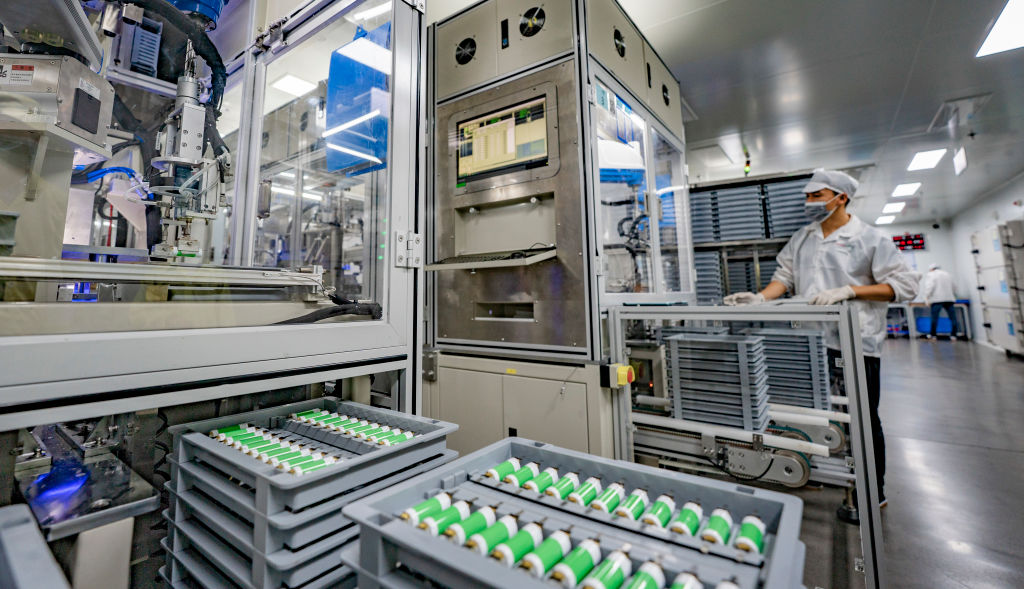
China’s lithium industry is reeling as its top production hub — responsible for around a 10th of the world’s supply — faces sweeping closures amid a government probe of environmental infringements.
The crackdown in Yichun, Jiangxi province, follows a local lithium frenzy over the past year as miners raced to feed rampant demand for the battery material — and to benefit from record global prices. Now, they’re grappling with a close-up inspection by environment officials sent from Beijing.
Ore-processing operations in Yichun have been ordered to stop as investigators probe alleged violations at lithium mines, Yicai newspaper reported. That threatens somewhere between 8% and 13% of global supply, according to various analyst estimates, although it’s unclear for how long the immediate shutdowns will last.
The probe in China injects a big dose of uncertainty into a lithium market that’s seeing prices cool — bringing some relief to EV manufacturers — as more global output emerges. Jiangxi province was expected to be a major source of extra supply, from a lithium-bearing mineral known as lepidolite.
“This supervision may mean that the inspection and control over lepidolite mining in China will be more stringent in the future,” said Susan Zou, analyst at Rystad Energy.
Read more: New Lithium Mining Technology Could Give Argentina a Sustainable Gold Rush
Companies with operations in Yichun include major battery manufacturers Contemporary Amperex Technology Co. and Gotion High-Tech Co., whose shares both fell more than 1% on Monday. Neither firm responded to calls and emails for comment.
Mining Boom
All lepidolite mining in Yichun aside from those by a state-owned company have been suspended, but refineries are still operational, Dennis Ip and Leo Ho, analysts at Daiwa Capital Markets, said.
Global lithium prices soared to a record high last year as demand from China’s booming electric-vehicle industry outstripped production. It’s the kind of high-profit, high-demand environment that typically encourages miners to skirt regulations in any commodity market.
ome companies had already been targeted for infringements, including incidents of pollution, over the past year. This is a much wider crackdown, and involves officials from central government departments including the Ministry of Natural Resources.
Healthy Development
The Beijing officials will mainly look at violations at lithium mines and seek to guide the “healthy development” of the industry, according to the Yicai report. It will largely target those mining without permits or with expired licenses, it said.
According to Goldman Sachs Group Inc., the Chinese car industry’s demand for lithium has fallen by more than half in recent months, a dramatic reversal that will drive a further slump in the market. Prices in China have dropped more than 30% from last year’s peak.
A month-long mining halt in Yichun would reduce lithium output by an amount equivalent to around 13% of the world’s total, analysts including Bai Junfei at Citic Securities Co. wrote in a note on Monday. Rystad Energy, a consultancy, estimated the amount at 8%.
“At present, the market speculation is that the probe may stop after the two sessions in China next month,” Rystad’s Zou said, referring to the annual parliamentary meetings due early March.
Lithium Shares
Lithium producers in North America gained Monday morning, with Albemarle Corp. rising as much as 2.9% and Livent Corp. advancing 2.6%.
Analysts said the shutdown of the lithium production hub in China may do little to help prices of the metal rebound from a recent decline, at least in the near term.
“Any mine would typically have a stockpile of ore in place, so as long as the refineries are operating, you aren’t likely to see any whipsaw in lithium pricing,” said Chris Berry, president of House Mountain Partners, an industry consultancy. “Should these mines be halted for months, then this becomes a different story.”
—With assistance from Alfred Cang and Jason Rogers.
More Must-Reads From TIME
- Dua Lipa Manifested All of This
- Exclusive: Google Workers Revolt Over $1.2 Billion Contract With Israel
- Stop Looking for Your Forever Home
- The Sympathizer Counters 50 Years of Hollywood Vietnam War Narratives
- The Bliss of Seeing the Eclipse From Cleveland
- Hormonal Birth Control Doesn’t Deserve Its Bad Reputation
- The Best TV Shows to Watch on Peacock
- Want Weekly Recs on What to Watch, Read, and More? Sign Up for Worth Your Time
Contact us at letters@time.com